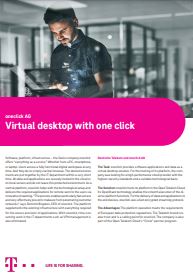IIn this article you will read about,
- how the Swiss company oneclick provides virtual desktop systems at the click of a mouse,
- how customers benefit from "everything as a service,"
- and why oneclick relies on OpenStack-based resources from the Open Telekom Cloud for its offering.
One click – everything there. The Swiss company oneclick delivers exactly what its name promises: the provider's customers access a fully functional IT environment via their browser within minutes, accessing software, platform, and infrastructure as a service as needed via a web portal. At the click of a mouse, they can access a modern digital workspace with all the necessary data and applications at any time and on any device.
This is practical for the users and at the same time an enormous relief for the IT departments. They no longer have to manually set up applications and access on laptops or smartphones. Time-consuming installations of various programs and solutions on local servers are no longer necessary. In addition, the IT staff no longer have to set up, manage, and update VPN connections.
This is because the entire solution for the virtual desktop infrastructure (VDI) is provided by oneclick via a central platform from the cloud. For this, the young company relies on the IT resources of the Open Telekom Cloud and encrypted access via an innovative streaming procedure for its customers in Europe. This means that all applications for the VDI systems are run exclusively in the protected cloud environment. Neither applications nor sensitive data ever leave their secure hosting location in the Open Telekom Cloud. At the same time, users always receive the exact current image of their virtual desktop via the browser – transmitted as a stream. "This method for delivering centrally-hosted business applications to end devices is very efficient and effectively prevents the intrusion of malware," says Dominik Birgelen, CEO of oneclick. "This is an enormous advantage over classic remote-access solutions via standard protocols. These offer significantly more points of attack for malware."
Working from home, mobile working, a wide-ranging branch network: Particularly when a company's workforce works at distributed locations, companies are increasingly turning to a virtual desktop infrastructure. "Our solutions are increasingly in demand in all work areas where many different end devices are in use and not all clients need to be connected via a VPN," says Birgelen. And that’s also thanks to the Open Telekom Cloud.
Another decisive factor: the high standards of security and data protection that the Open Telekom Cloud offers as both a German and a European solution. If a customer needs the applications from a data center outside Europe, for example because low latencies are required for an on-site production facility, oneclick also works with hyperscalers such as Microsoft Azure. Likewise, customers' existing on-premises solutions can be combined with the cloud infrastructure if desired.
Birgelen and his team are also impressed with the Open Telekom Cloud because of the underlying OpenStack technology. "This allows us to connect our platform to the cloud resources very simply via a standard interface. Otherwise, extensive programming work would have had to take place here," says Birgelen. In addition, oneclick uses the Cloud Container Engine of the Open Telekom Cloud based on Kubernetes to build, manage, and update customer environments.
The young company, headquartered in Zurich, has already attracted several large VDI customers together with Telekom, including in the education sector, healthcare, and a German insurance company. Since February, oneclick has also been a participant in the Open Telekom Cloud`s new "Circle" partner program. One of the goals of both companies is to "grow together," says Birgelen.




